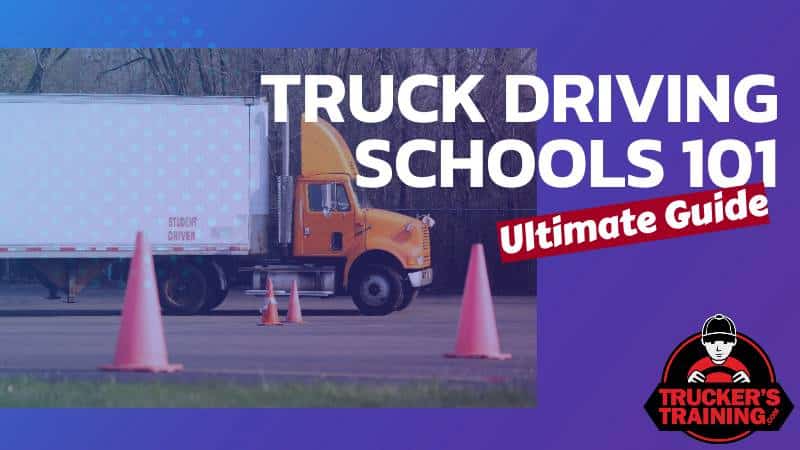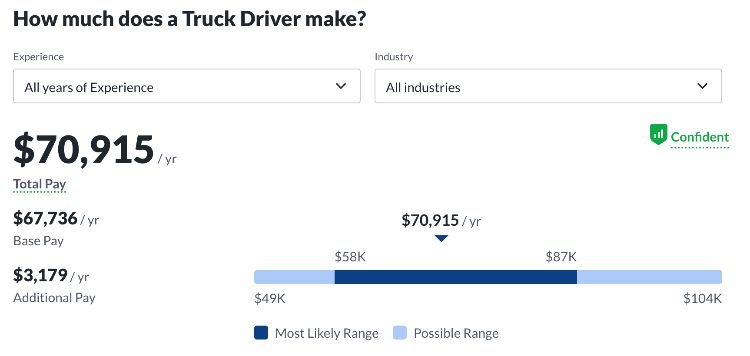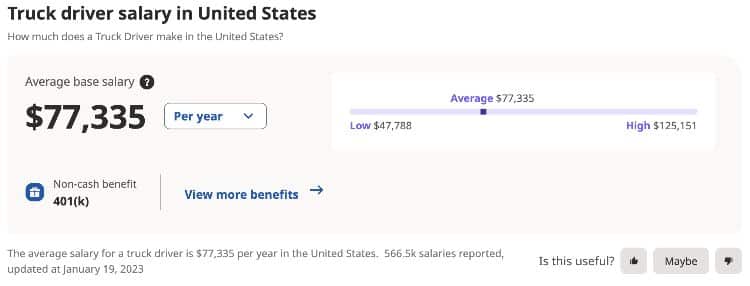
If you want to become a truck driver, then it’s worth researching which truck driving school is the best for you.
Given that you will pay to go to one of these schools, you want to make sure that your money buys you the best training so you can land yourself a trucker job.
This report sets out all of the information you need to have, so you can choose from the top national truck driving schools. Currently there are around 9 million people in the United States working in the trucking industry. Of these there are 3 million drivers working for more than half a million tractor-trailer operators.
The Basics of Professional Truck Driving
The truck driving industry is growing and there is a long-term shortage of drivers. That is a fact that nobody is disputing.
It is evident in the BLS statistics and every transportation, haulage and logistics company’s human resources department is under pressure to hire and retain professional truck drivers.
Truck Driver Pay
According to BLS, the median income for truck drivers was $48,310 (May 2021). Income potential for truck driving is around $30,000 to $65,000 per year for most positions on the road. Experienced drivers can earn more. Management and Instructors earn more based on position and experience.
And according to Glassdoor.com a truck driver’s average base salary is $70,915 (based on close to 56,000 reported salaries (as at January 24, 2023). See the following image:

And with Indeed.com, a trucker’s pay is $77,335 (as at January 24, 2023) showing a higher salary. The difference is likely due to who is reporting the salary, their level of experience, and their specialty.

In both images above, there is a big variance between the upper and lower pay, which is a result of length of experience, level of training, specialization, location and the employer.
Independent Contractor Salary
Truck drivers who lease their trucks, go self-employed, and stay on the road as much as possible, are able to earn considerably more.
According to Indeed.com, Owner Operator Truck Drivers can make an average of $320,822 per year. On the low end, your salary can be $191,00 per year up to $536,000 per year as an independent contractor.

However, that makes the driver responsible for their own expenses and compliance issues regarding regulations and laws.
This route does give more independence and is a beloved way of life for many independent truckers across the country.
If you think that you may want to become a self-employed truck driver and you have yet to begin the career you might want to take it step-by-step and start as an employee for one of the big freight companies, once you have qualified for your Class-A CDL.
The long haul companies often hire before you begin training, employ many first time truckers. They also lease trucks to experienced drivers who want to go it on their own and take responsibility for their finances and careers.
Who Hires Professional Truck Drivers?
If you have a particular organization that you desire to work with give them a call and ask who they recommend as a driving school in your area. Some of the largest companies train their own drivers and still hire considerable numbers from outside schools. You don’t know until you ask; so ask if they provide help with tuition and under what terms.
Below lists some of the larger transportation firms that hire from truck driving schools across the country. Many of them have relationships with multiple schools and provide training services at the same time. The next time you drive down the freeway notice how often you will see some of these names.
Depending on your region you may see many or some of them regularly on the road. Chances are that you will see some of them a lot. There are many others and it will help to do your own research through online services such as Glassdoor.com.
How to Become a Truck Driver
If becoming a professional truck driver is your ultimate goal, you will want the best possible education and experience on the road before you commit irreversibly. You can take a CDL crash course and then take advanced courses later.
1. Go to an Independent Truck Driving School
A professional truck driving school will teach the skills needed for advanced handling that includes:
- Dealing with diverse road situations
- Business and customer service skills
- Learn how to drive in the most fuel-efficient way
When you are responsible for your own costs you will want to get the most out of every mile on the road. For self-employment, advanced training is a must if you do not already have years of experience on the road.
Community colleges that provide CDL training will certainly give you a number of college credits for completing your course but they do not have the same imperative to make certain that you get fully licensed or employed in the field for which you trained.
Maintaining a tractor-trailer rig is expensive and to pass the test you need to have a vehicle that will pass inspection before you take the driving test. The first thing you do is a pre-drive inspection of your vehicle with the examiner looking over your shoulder.
The examiner will judge whether you know what you should be looking for but they are checking out your truck at the same time, it’s just that they make you do all of the work!
A suitable vehicle that will pass the pre-drive inspection might turn out to be difficult or expensive to find. A school with a well maintained fleet of trucks and the experience to guide you past all of the obstacles to getting your license is very likely to be the better option.
Why Go Beyond the Basics?
Professional truck driving courses will train you to a high standard; their trainers and instructors are selected from the best in the business. Truck driving schools are dependent on their reputations for getting students through the state examination process.
The truck driving schools that have connections with multiple freight hauling companies are the ones that will get you placed in a good job on the road. They include additional driving time and cover different equipment such as long trailers.
The ones selected as the best in this report publish their prices; all companies have a right to withhold that information of course. However, it is a well-worn and very profitable hard-sell tactic to build up the service before giving the price. You want to avoid that and make the decision on your own terms.
Entry-Level Driver Training (ELDT)
Before February 7, 2022, if you wanted to become a truck driver, it was not necessary to get training. However, now, FMCSA is mandating truck driver training, called Entry-Level Driver Training or ELDT, for those getting their Class A or B commercial license for the first time; if you are upgrading your license from Class B to A; and/or if you want to get the following endorsements: P (passenger), S (school bus), H (hazardous).
ELDT was implemented to increase road safety when involving trucks and passenger vehicles.
CDL Tuition Cost
The costs of professional truck driver training can vary widely. When you are looking for a new career it tends to be one of the primary considerations. You will want to look at exactly what training you need and what you will be able and willing to pay for a $50,000 per year new career.
You will get the broadest qualification. Tractor trailer rigs are pretty much standard and you will get a Class-A license with the widest possible range of endorsements and the least possible number of restrictions.
- See Table 1 below for the range of prices you can expect to pay across the country
2. Go to Schools Run by Trucking Companies
Haulage companies operate some of the best national schools. They will be evaluating you and deciding whom they will hire for their own internal positions, as work becomes available.
Those companies that do not have their own schools are familiar with many of the truck driving schools and often put on job fairs at the schools to hire new drivers directly.
3. Do On-the-Job Employer Training
Some employers train commercial drivers from within the company. This might be a good way to get a foot in the door especially if you’re getting trained to obtain a Class A commercial license. But if you get only a Class-B or Class-C license with a minimal number of endorsements and too many restrictions, you are going to be severely limiting your career and income options.
With on the job CDL training you will get paid while learning to drive a commercial vehicle right from the get-go. Training, like those through independent CDL schools, will take typically 3-4 weeks, where you’ll learn the basic operability of the vehicle, how to inspect the truck, learn how to turn, dock, and overall road safety. At the end of this stage, you’ll be able to do the road test to get your CDL.
Once you successfully complete this stage, then you’ll move to on-the-job training. This involves real work – working on live freight – typically with a company trainer who will offer training and feedback as you’re working.
After completing this stage, then you’ll start working on your own, driving your own company truck. At this phase, you’ll get paid by the mileage, which is the typical salary model of how truck drivers get paid. Whereas the first 2 stages you will get paid a fixed amount.
Know What You’re Getting Into
Here’s the catch with on-the-job training – because the company is essentially training and paying you at their expense, there is a time commitment required to the company. Typically you are required to stay with the company for a minimum of 12 months to 24 months.
Ultimately, you might still decide to go to a proper truck driving school at a later date. It is never too late to get your license upgraded to one that qualifies you as a truly professional truck driver.
A truck driving school will give you a well-rounded preparation not just for the driving test but also to be a better driver. You will learn about safety on the road. Better driving skills also means potentially better fuel economy. An improvement of just 5% in fuel economy can lead to thousands of dollars in savings each year.
4. The Self Taught Option
You could beg borrow or buy your own truck and teach yourself to get through the test in the right circumstances. However that is no longer possible with the mandatory Entry-Level Driver Training. To get your commercial license to drive trucks in Class A or B categories, you will need to go to trucking school through a registered trainer.
Before the ELDT mandate, some drivers claimed to have gotten their CDLs without going to school, but likely they weren’t set up for success. There is also the factor of getting through the test but not having the experience or knowledge of the road to avoid bad habits and the basic traps that beginners fall into when they do not get the proper guidance at the start of their careers.
The jobs and careers are definitely out there. Haulage companies are always looking for more drivers and the demand is predicted to go up in the next few years. If you are well qualified you will never be short of job options.
Career Placement
The difference between a CDL prep school and a professional truck driving school is the difference between coaching to pass a test and comprehensive career training.
The least expensive option to get a CDL license is to take the cheapest possible route to just get through the examination.
If you want to be in a position of strength to choose your career the point is to have the broadest training and license so that you have the most options.
If you want to have a better education that serves your career in the long term and possibly even reduce the chance of accidents and injury at some point in the future you may wish to get a proper training. The possibilities in truck driving are wide open.
Commercial License Basics
To become a truck driver you are required to meet federal and state requirements to get your CDL.
Note: Check with your state’s Department Of Motor Vehicles (DMV) to learn the exact requirements in your area.
After you pass the written tests, pass the physical exam, and complete the necessary training, you can go for your driving test with a suitable, roadworthy vehicle.
There are many variations of truck driving license or CDLs. Federal laws and regulations that coordinate all of the states’ licensing systems define them. This way states can be confident that out-of-state long-haul drivers passing through, along the highway system will meet a standard level of safety and training.
This standardization is important for the nation and helps to keep interstate commerce moving freely. The important thing for truck drivers is that it means you can cross state lines for work without having to be licensed in any state other than the one in which you are stationed.
ABCs of CDLs
There are three classes of commercial driving license defined by the Federal Government:
- Class-A enables you to drive most anything
- Class-B lets you drive almost anything that does not have a trailer
- Class-C limits you to smaller vehicles
For more details on the 3 classes of CDLs, go here.
There are special endorsements that are required for licensing where safety might be an extra high level concern, such as driving passengers or hazardous materials. Finally, there are restrictions based on the vehicle you test in.
Your DMV will want to see that you can handle certain functions before they sign off on letting you loose on the road. This includes handling vehicles of a given size; the size of vehicle that you test in will set the maximum vehicle weight restriction.
The state examiners will want to see you inspect and demonstrate airbrakes and manual gears, show up for the test in a vehicle without these features and your license will be flagged that you are restricted from driving vehicles with them.
Note: Get a copy of your state’s Commercial Driving Handbook from your DMV’s website or office to learn the exact details.
The level of training you receive will likely be a strong indicator of future success in the industry. So the best quality of education and training you can get for your investment is always going to prove to be the best value-for-money proposition.
In any case, there are hundreds of private driver training options available and there are some good reasons to learn to drive at a private truck driving school.
The real question is how to find a school where you can be confident of receiving a high standard of training and a good chance of getting your career off the ground, once you pass the CDL driving test.
The Criteria for Top Truck Driving Schools
Training Beyond the Basics
- Programs of more than 200 hours of instruction and longer duration than one month
- They must give more time to train than the absolute minimum to get through the examination
- Will get you pre-hired and have more than one major company that hire their graduates
- They have a certification from one of the two national bodies that take responsibility for certifying truck driving schools
Registered with FMCSA
The trucking school you select should be registered with the FMCSA and is able to meet the Entry-Level Driver Training standards, which are:
Theory
- Basic operation
- Safe operating procedures
- Advanced operating practices
- Vehicle systems and reporting malfunctions
- Non-driving activities (e.g. HOS requirements, handling and documenting cargo, trip planning, etc)
Behind the Wheel
- Range Training: vehicle inspection, straight line backing, alley dock backing, off-set backing, parallel parking, coupling and uncoupling
- Public Road Training: vehicle controls, visual search, communications/signaling, night operation, extreme driving conditions, etc.
There are no minimum instructions hours for both Theory and Behind the Wheel training, however, the instructor is required to document that the truck driver trainee is proficient in all areas of the required curricula.
Professional Truck Driving Schools and Tuition Costs
| Course Length (hours) | Tuition and Fees |
|
|---|---|---|
| HDS Truck Driving Institute | 730 | $7,900 |
| National Tractor Trailer School | 602 | $10,200 |
| Iowa Central Community College Transportation Technology Center | 600 | $6,300 |
| Great Lakes Truck Driving School | 600 | $10,000 |
| New England Tractor Trailer Training School - NETTTS | 540 | Contact School |
| Northern Industrial Training | 480 | $18,000 |
| Commercial Driver Training | 304 | Contact School |
| Sage Technical Services | 300 | Contact School |
| Houston Community College Northeast Commercial Truck Driving Center | 282 | $3,375 |
| College of Southern Maryland Center for Transportation Training | 280 | Contact School |
| International Trucking School | 260 | Contact School |
| Professional Drivers Academy | 240 | $5,500 |
| Center for Employment Education | 240 | $8,500 |
| American Truck Schools | 240 | Contact School |
| Des Moines Area Community College Transportation Institute | 240 | Contact School |
| Central Tech Transportation & Safety Education | 210 | $5,250 |
| Heavy Metal Truck Training | 200 | $5,000 |
| Continental Truck Driver Training & Education School | 200 | Contact School |
| Maines Driver Training Institute | 200 | Contact School |
| Napier Truck Driver Training | 200 | Contact School |
| Trans American Technical Institute | 160* | $3,000 |
| Interstate Truck Driving School | 160* | $4,000 |
| CDS Tractor Trailer Training | 160* | $5,000 |
| Vocational Training & Resource Center | 160* | $5,000 |
| Ozarks Technical Community College Transportation Training Institute | 148* | $3,500 |
| Katlaw Truck Driving Schools | 140* | $3,200 |
Figure 1 Truck Driving Schools with programs in descending order of length in hours. * Indicates short courses of less than 200 hours, included for comparison.
Train for the Future
The ongoing shortage of drivers in the twenty-first century is likely to be resolved ultimately by automation. Companies such as Google and Mercedes-Benz are already looking to create self-driving vehicles and provide smart cars that can navigate across the country. That does not mean that jobs that are currently out there will go away.
It is more likely that the nature of the job will change; each truck will probably have a driver riding along and relaxing in the cab ready to take over if the need arises. Truck driving regulations restrict the number of hours a driver can be on the road; a self-driving truck can drive ceaselessly day and night.
There will still be jobs for professional drivers for years to come; humans are hard to beat as decision-making and problem-solving units. This could mean each vehicle moving much more freight per year than can be done with human drivers. Ultimately, the role of driver will probably become more of a supervisor and drone pilot, sitting in a management center somewhere monitoring a squadron of trucks.
Either there will continue to be a strong demand for professional drivers or there will be a radical change in the way that the transportation industry works. In either case professional drivers will be in better form than the guy who borrowed a truck and read the book just before the test.
The skills of the professional driver will be needed for management, supervision and as instructors for the next generation of the road, whether it is composed of robots or young new human professionals.

Geoff is a freelance writer at TruckersTraining.com with 20+ years of experience driving trucks and buses, dispatching, supervising, and training commercial driving teams. His expertise is writing topics on the transportation and trucking industry, and information technology trends.








